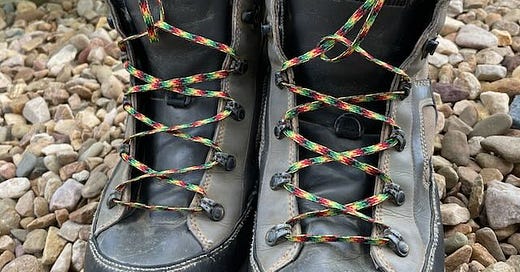Don’t make it harder than it is
As a guide and instructor, I often hear “fly-fishing seems hard.” Most of the time they are talking about casting. But is it really? Or are they making it harder than it really is? Yes, casting a fly line with a fly rod takes skill, so does brushing your teeth. The truth is you must learn the fundamentals, which are simple by the way, and then practice them. If you break down the steps rather than focus on the outcome, the cast comes together. When they get caught up in seeing the fly go to the water rather than executing the fundamentals, they are making it harder than it needs to be.
Don’t overthink it.
One of the best in the fly-fishing business, Tom Rosenbauer, quoted in a Boston Globe article, said, “Don’t overthink it. What we do is really stupid, and if you think too much about it, you’ll quit fishing.” Rosenbauer is correct, it’s easy to get wrapped around the axle, getting caught up in the myriad things that entail fly-fishing. I’ve said to clients or students, frustrated by some part of fly-fishing, to stop and think about what we are doing. “Our tradition is that of the first man who sneaked away to the creek when the tribe did not really need fish.” That sums it up well. If we aren’t out here doing this for any other reason than to enjoy ourselves, we are making a big mistake. I’d hate to think I spent all this time and money for any other reason.
Solutions
Looking on LinkedIn, I came across this video Daniel Abrahams used to illustrate the adage, "People don't buy products; they buy solutions to their problems.” It got me wondering about the fishing gear I have. Why did I buy what I did? Doesn’t matter what it was, I bought it because I thought it would do something I wanted done. I’m not immune to the occasional “vanity” purchase, meaning I thought they looked good as well as functional (I’m looking at you fancy wading boot laces1.) Teaching and guiding I have to get my client to “buy” my solution and to do it right, I have to work at keeping that mind set.
Backcasts
Kirk Deeter’s article, Fly Casting: What You See is What You Get addresses a question I get time to time from students and clients; “should I look at my back cast?” And like most guides and instructors, my answer is “it depends.” Here’s the thing; your back cast underpins the forward cast. As Deeter writes, if it’s bad, “it probably won’t fix itself when it unfolds in front of you.” My advice is like Deeter’s, look but don’t turn to do it. Move your head, not your shoulders or hips. Watch out of the corner of your eye. Practice so you can see just enough to know it’s a good back cast without turning to see it unroll all the way.
Thinking about Jimmy Buffett
Like for many of you, the passing of Jimmy Buffett was sad news. I suspect his music was part of the soundtrack of your life. It certainly was part of mine. His books were as delightful as his music. His words in both were stories that stuck with me. He was one of the few musicians that my mother and I shared a common affection for, and for many of the same reasons. One of the totems I carry in my fishing kit is a carved jade manatee. It’s a touchstone linked to these words from his song “Growing Older But Not Up”:
“Sometimes I see me as an old manatee
Headin' South as the waters grow colder
Tries to steer clear of the hum-drum so near
It cuts prop scars deep in his shoulder.”
I always hated the hum-drum and risked the scars to steer clear. It’s why I do what I do.
Let’s keep the party going.





Ha! I haven't gotten them wet yet since it has been so dry, but they are kinda snazzy looking...And you will note they are the sartorial complement to my crocs... ;-)
Great. So I now I want new laces.